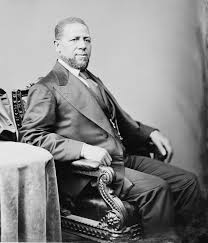
American history is a menagerie of episodes both patriotic and less-than-desirable. Our history is a saga of both slavery and freedom, justice and oppression. It is a story of Jim Crows and Martin Luther Kings. All in all, while American history may not be spotlessly heroic, it is counterproductive to shout the woes of American history to the world while whispering our greatest moments to our closest companions. Those who hate America have sought to write our history with the blood of Natives Americans, the sweat of slaves and the cries of women. This overlooks some of the most amazing stories of human history however. One man who played a critical part in our history and gives us hope and optimism for the future is Hiram Revels, the first African-American man elected to the United States Senate.
Hiram Revels was born free in 1827 in Fayetteville, North Carolina. He worked early on as a barber in his brother’s shop in Lincolnton, North Carolina. In 1845, he was ordained as a minister in the African Methodist Episcopal church (co-founded by Richard Allen and Benjamin Rush in 1787). He worked as a minister of the Gospel for two decades in the African Methodist Episcopal church. In 1865, he left the AME church and became a Methodist Episcopal. He was pastor of a church in Baltimore, Maryland and while there, he was principal of an African-American school.
During the Civil War, Hiram Revels led African-American troops in the Union army and participated in the tide-turning battle of Vicksburg. He was a chaplain in the army during the Civil War as well. After the war, Revels and his family settled in Mississippi, where he was a pastor. Revels was elected to the Mississippi State Senate in 1869 and that same year, the state legislature elected him to the U.S. Senate. (In those days, before the Seventeenth Amendment, the state legislatures, not the people, elected U.S. Senators.) Thus, Hiram Revels, a Republican, became the first African-American in the United States Congress, ironically taking the seat of former Confederate President Jefferson Davis.
Revels’ election was not without controversy. Southern Democrats wanted him out and did all they could to keep him from being sworn-in. In 1870, eventually, after much debate, Revels was sworn-in and history was made. During his short term in the Senate (1870-1871), Hiram Revels advocated amnesty for former Confederates granted they swore loyalty to the Union. While his fellow Republicans advocated a radical Reconstruction program, Revels’ plan was one of grace and forgiveness. He fought for equality for African-Americans and advocated desegregating Washington D.C. schools. Despite his efforts, many of his advocated reforms were overturned by his white colleagues. Yet, in it all, Hiram Revels lived in the spirit of 2 Thessalonians 3:13: “As for you, brothers, do not grow weary in doing good.”
Revels resigned from the Senate to accept a job as President of Alcorn State University, in Lorman, Mississippi. He also served as Secretary of State of Mississippi in 1873. He settled down in Holly Springs, Mississippi to pastor a church there. He also taught theology at a African-American seminary there. He died in Aberdeen, Mississippi in 1901.
The legacy that Hiram Revels passed on is incredible. He was one of the greatest African-Americans in history. He stands side by side with men like Martin Luther King Jr. and Frederick Douglass. Revels fought valiantly for justice and equal rights for African-Americans. He did not demand anything more than justice, equality and liberty. He was a courageous man of God, who not only spoke eloquently in the Senate chamber but also preached God’s Word from the pulpit, most of his life. He was an advocate of improved infrastructure, education and civil rights. Hiram Revels’ life tells another side of American history that few historians today will tell. He was the quintessential American: a valiant defender of liberty, a crusader for justice and equality, and a devout Christian who placed his trust and hope in God.
